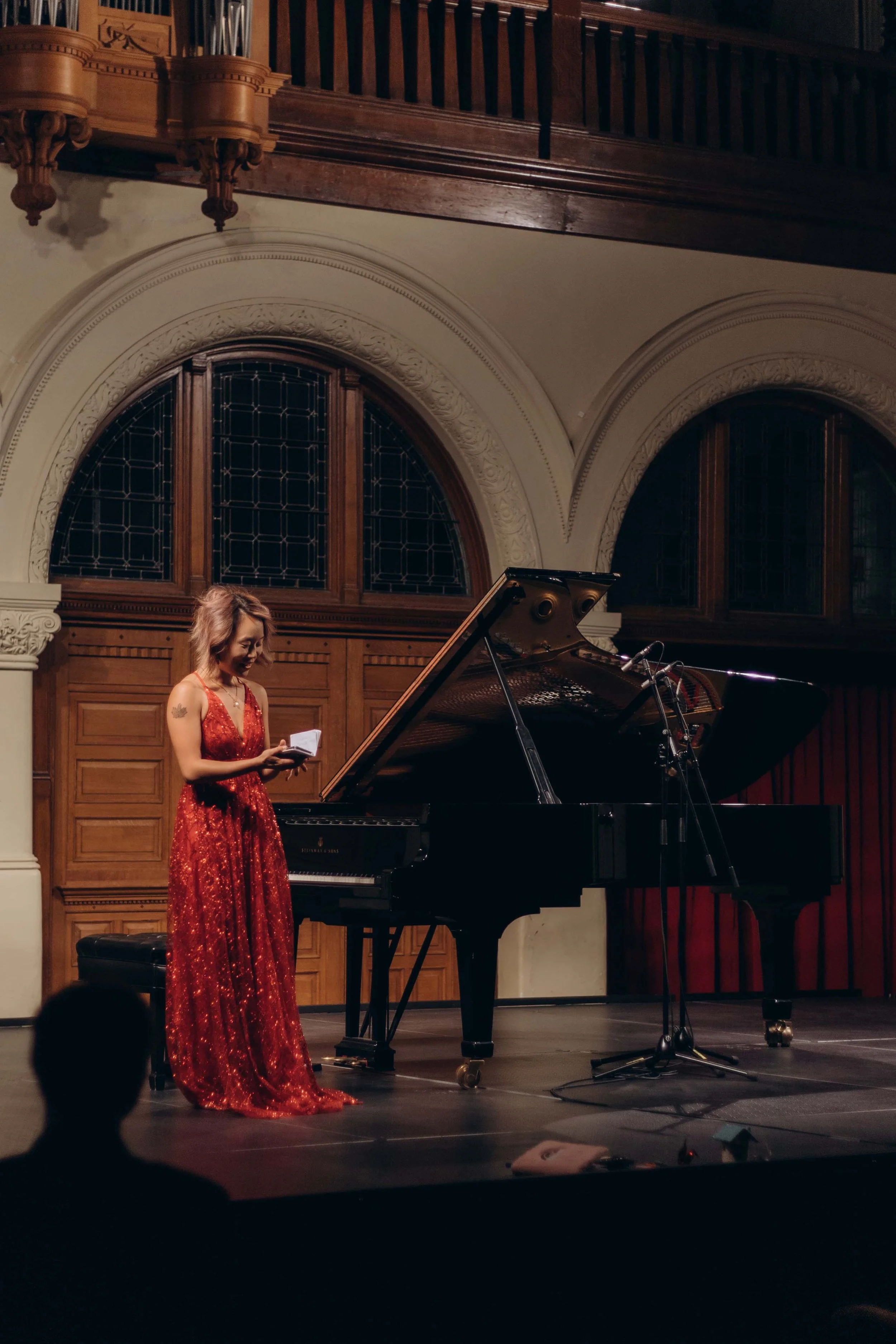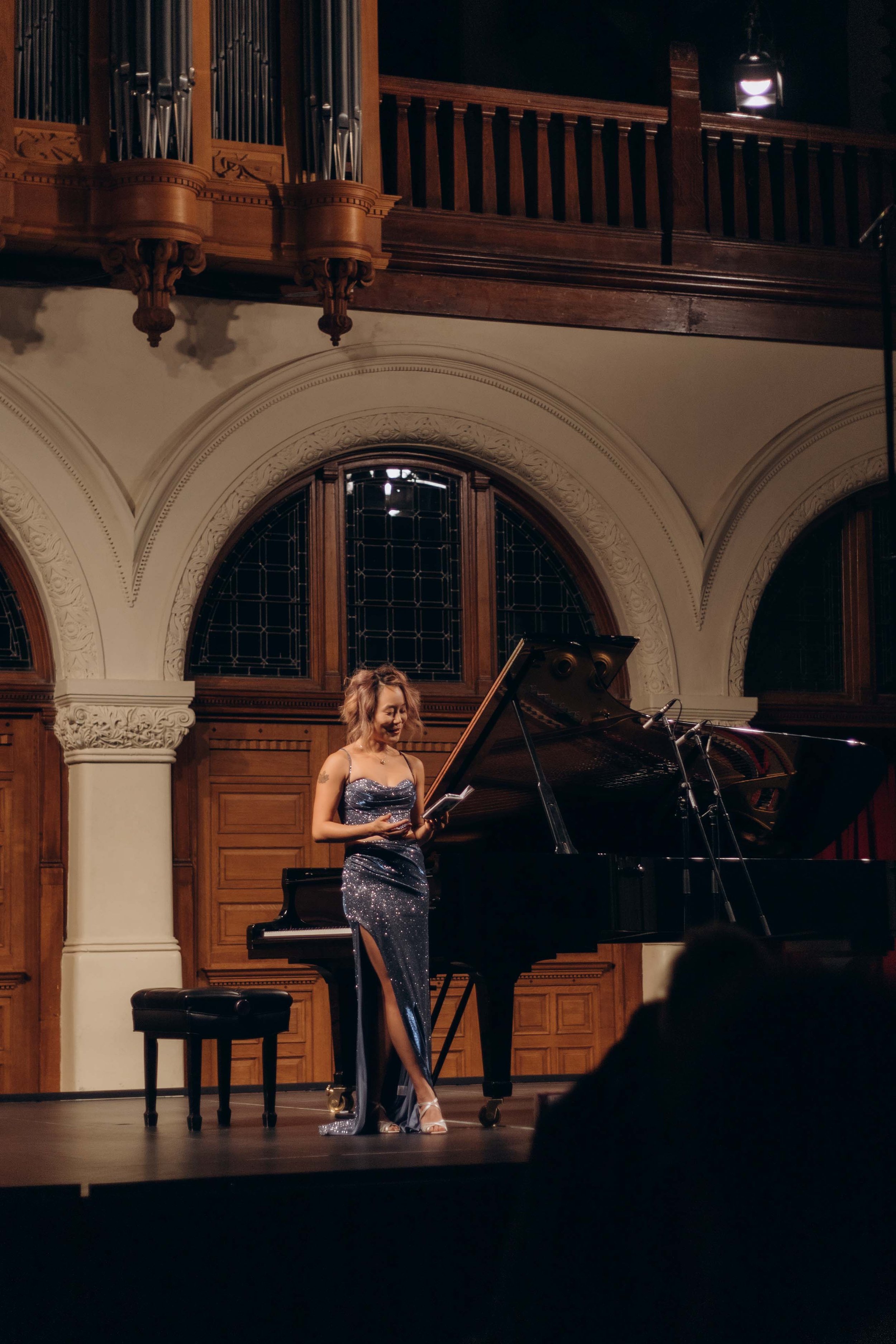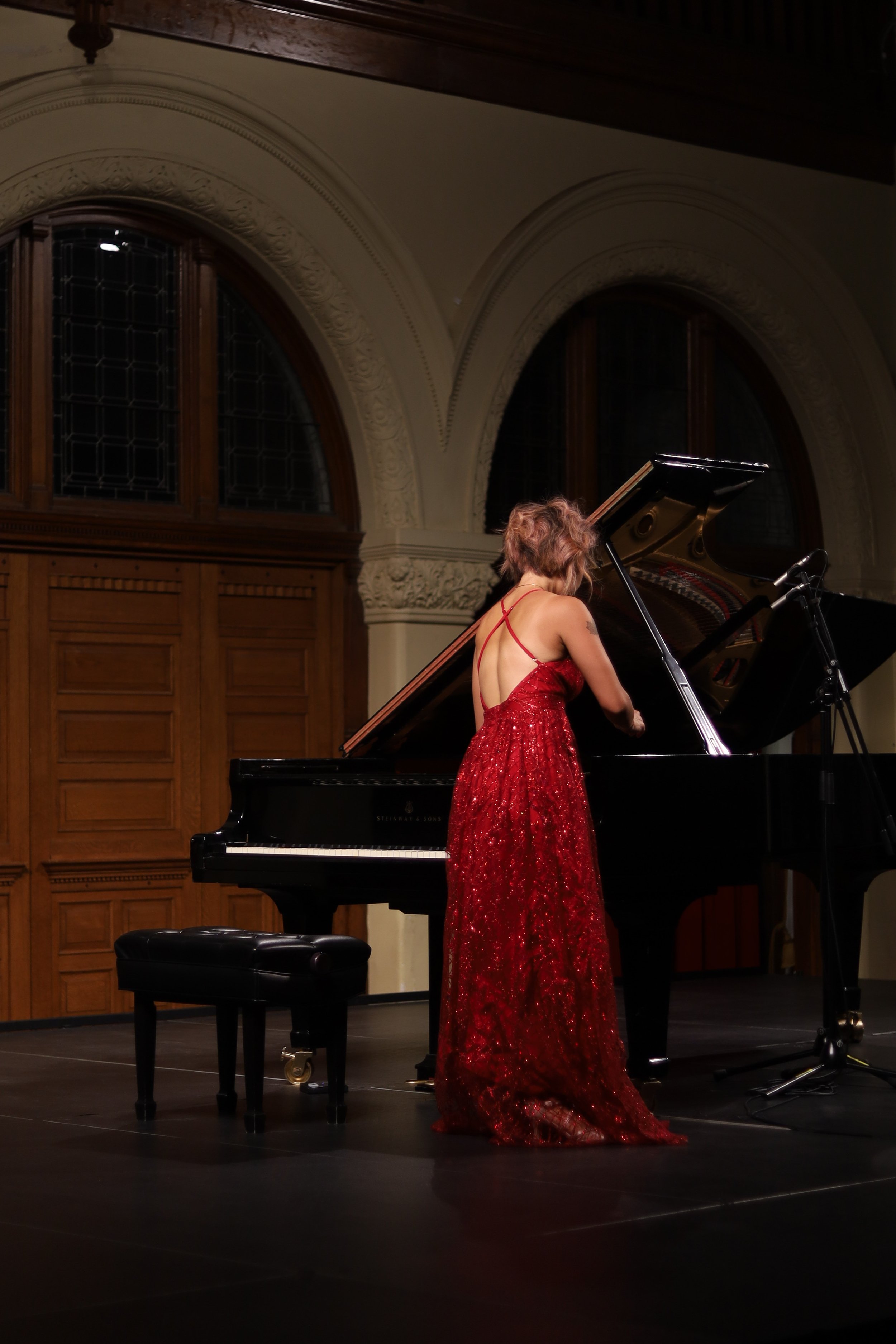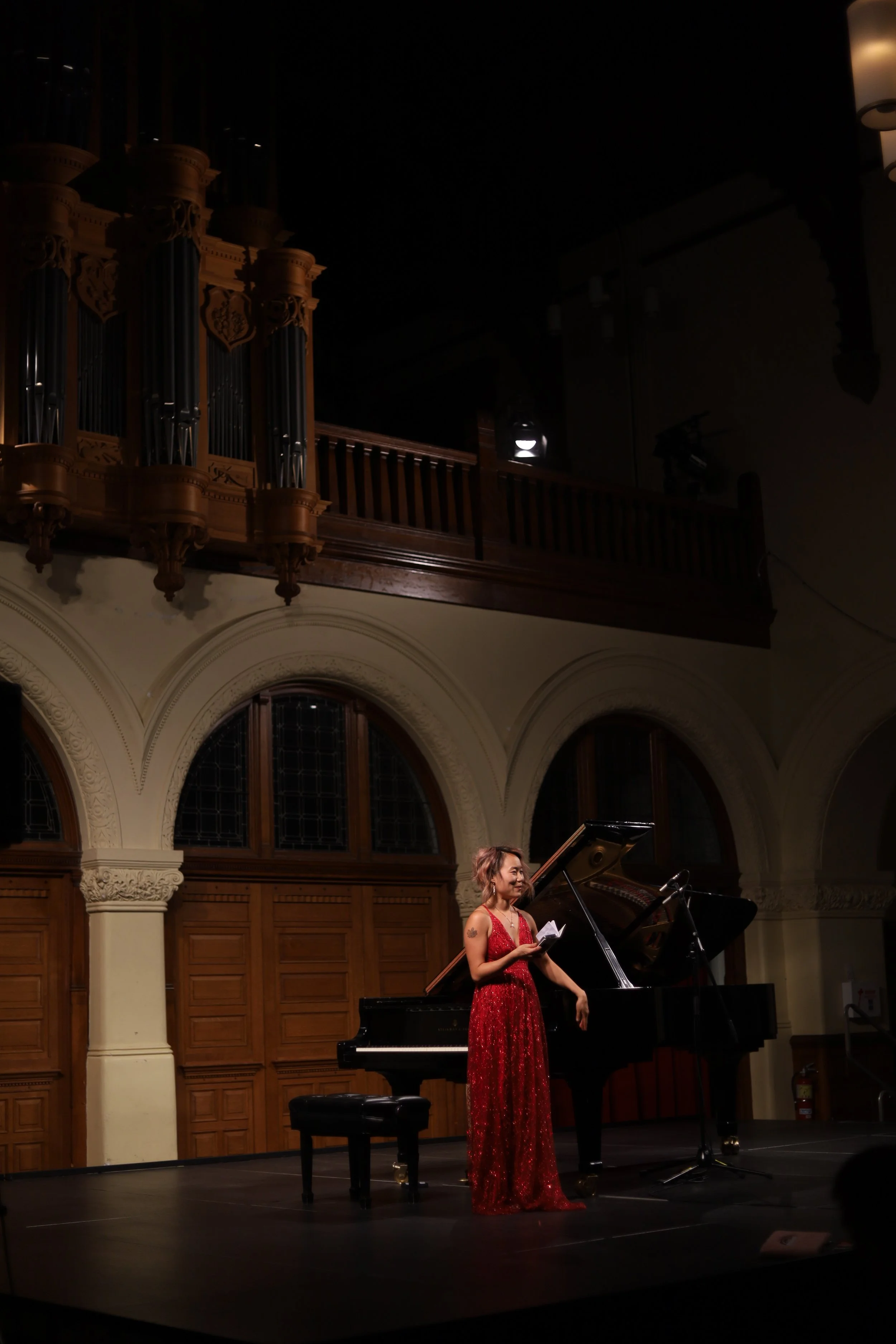Solo Recital Recap "Towards the Flame"
Good evening, everyone. Thank you all for gathering here tonight to celebrate a special milestone with me - professionally and personally. This is my final doctoral recital, marking 8 years at McGill. This is also a deeply personal program.
All these pieces are associated with some part of my past that I am still learning to come to terms with, some of the darkest moments I want to redefine, and also some of the most trying and most courageous moments I want to honour again.
That being said, it’s funny how while preparing for this recital, a testament to my strength and growth, I’m again and again astonished and humbled by my limitations: how certain demons still come back, how we need to learn to live with them, face them again and again.
So this program has become more of a story of courage. And acceptance.
Scriabin
Scriabin wrote this sonata at 20. This incredibly dark funeral march sonata. It’s wild if we take a moment to think back to when we’re 20, for some of you maybe that’s recent or maybe you’re not there yet. But it’s always jarring to realize how intensely how tragically how strongly we felt at that age. How tormented, how devastated we could be by the youthful fire of our emotions, our love, our tenderness, our triumphs and weaknesses.
This sonata is full of drama, angst, and despair, but what’s striking is at the end - in between the funeral march, when we enter that realm beyond suffering. Otherworldly, transcendent, timeless - with these barely audible sustained chorale-like chords. There’s a sense of peaceful serenity, acceptance. But sometimes I wonder if it’s also the void - that calling of nothingness. Emptiness. Silence. Perhaps in the void, there’s a noble silence.
I’ll leave with some excerpts I recently rediscovered from my journal from when I was 20, back in late October 9 years ago:
“Painful.
‘Strong’, crumbling, choking.
Exhausted.Distant, drained.
Nothing.
Dead.Shut down. Explode.
Wander, aimlessly.Smiley face. Smiley face.
Dazed.
So tired. So sick.Empty smiley face.
Ha. Ha.Painful or empty - I couldn’t even tell.”
To tear me to pieces. To break me again and again, drowning me, suffocating me, overwhelming me with regret, pain, loneliness, suffering … hope. Heartbreak. How could your heart, your soul feel like it’s dying, and then dying again and again when you thought there’s nothing left to feel. That’s the way it is. You wish you could claw your heart out.”
Ho
The Ho is a special story I also wrote around 20. It’s a story of love and friendship. It’s about friends who don’t always do a good job loving or understanding one another. Yet - finding courage to trust, to love, to hurt, and to live again. You can read the program notes and full libretto with the QR codes.
In the second movement one of the girls helps her friend calm down from a panic attack by singing a lullaby and reminding her of their ritual of tracing the character “human” in her hand. I think in moments of the most intense despair or pain -
There can be a kindness to our pain. Kindness to our contradictions, our madness. That’s another mantra for myself for these characters for our loved ones “be kind. Be brave.”
One more request - I love sharing stories, I believe we are made of each other, no matter how briefly our paths cross. That’s why I have this cute fluffy pink rainbow guest book here. If you would like, please leave me a note, a story, about when you were saved by someone, something.
I’ll leave with lyrics from one of the songs.
“Understanding happiness”
Kansa
What is understanding?
Is it happiness, or unhappiness?
Does it bring us closer, or push us apart?
Perhaps it’s both.
A continuous process.
A beautiful, painstaking attempt
Towards moments of happiness.Sky
So let us keep trying.
A lullaby, a bandage, and a cupcake
It takes just a little belief and magic,
To find a moment of understanding.Kansa
A brief moment.Sky
An extraordinary moment.Kansa and Sky (smiling at each other)
Magic and truth.Kansa (in guardian’s voices)
Can you believe?
“I understand”.
Do they?
Is that understanding?
Could you be allowed that happiness?Kansa
Yes. Yes. Yes.
Our messy attempts,
Are more than enough to believe in.
My lovely derps, I believe you.
You came into my maze,
And embraced all my pain.
You found me,
Time and again.
“Rosemary”
Once you turned to me
With crumbs on your face, and say
“What a mess we made.”I laugh between tears, and ask,
“Do you remember
That rosemary cake?”
Your wish is my promise.
Dare you to love.
Dare you to live.
Dare you to believe.In the mess,
There is magic and truth.Remember your heart.
Remember your pain.
Remember my promise.In the mess,
There is magic and truth.”
Chopin
Chopin’s second sonata is one of my most beloved yet also most emotionally draining works - no matter how much time has passed, it’s still triggering to come back to it. I wanted to program this work originally as a testament to my growth - overcoming those traumatic moments, but how naive. What I’ve come to accept is that there’s a cyclical nature of death. Of grief.
But what’s more important - I realized, is that this music, its meaning, its message, story, has become so much more than just for myself, about myself.
9 years ago, after I performed this work, when I didn’t even know if I could or would wake up that morning, an audience came up to me and with tears in their eyes shared with me how at that return of the funeral march after the sublime trio, they finally were able to process, remember, and feel a deep buried grief, how cathartic, how beautiful that moment was. And those are the moments and stories that stay with us forever.
There is strength in sharing stories. Grief in solidarity. And I encourage you again to let me know, whether in writing, or to tell me afterwards. Because these are the pieces of each other we’ll carry in our hearts for decades to come.
During the past decade, and even recently, I’ve witnessed friends lose parts of themselves, their own flesh and blood. I’ve heard people’s struggles with losing their family - mothers, fathers, grandparents. Whether suddenly, recently, a year ago, or ten years ago. It still comes back to haunt us. It still can hurt so visceral, so unpredictably. It comes with the seasons, it lives in our bodies. So this is my story to yours, a homage and tribute to all of you, all of you who have loved and lost. Thank you for bearing that love and grief. Thank you for living.
Stravinsky
We’ve come to the final part of the program. The firebird.
As many of you know, I love magic. I love fairytales. There’s something so exhilarating, enchanting about them. But they’re also so real. They hold some simple, powerful messages.
The story of the firebird is a slavic myth where Prince Ivan uses a feather from the firebird to help him defeat the evil king sorcerer Katschei. The piano suite takes place at the end of the ballet. In the infernal dance, the firebird casts a spell on all of king Katschei’s subjects and they launch into this manic grotesque dance. In the Berceuse, a hypnotic lullaby, she puts them to sleep. And finally wakes them up in a grand finale after Prince Ivan defeats the king and releases the captured princesses.
It’s a lovely fairy tale, full of drama, mysticism, and triumph. And at the same time, there’s something so deeply moving in the finale, when we hear that distant horn call - a noble reverence.
I love the concept of a magical object to give us power and strength. It might be just the power of our imagination, but again, like the labyrinth of tears, whether it’s a mantra, a feather, a leaf, we can draw our strength and magic from endless possibilities. For me, I always collect fire red maple leaves wherever I go, one was from my Ottawa concert, this was from Mont Tremblant yesterday, when I called on the forest for blessings, for strength, and where I said thank you, for letting me live.
I think simply, this concert has been about acceptance and courage, but also, ultimately, as always - gratitude. That’s the magic.
Gratitude.
End.
Thank you all for being here. I want to especially give a shout out to my family, as always. My teacher. My friends. And my partner, for taking care of me through the ups and downs, and seeing this whole journey through my finest hour and weakest moments. I am so grateful for you all. Thank you.




































































































































































































